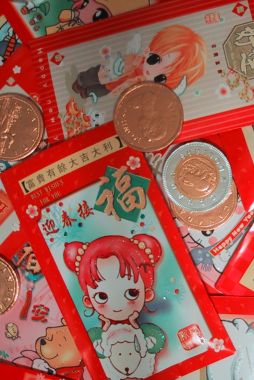Red packet
|
|
A red packet or hong bao (紅包) is a monetary gift which is given in Chinese society. The name comes from the red packet in which the money is contained. It is called Lai Si (利是) in Cantonese.
Red packets are often presented on social occasions such as a wedding reception or a holiday such as Chinese New Year (in which context it is also known as ya-sui qian, 压岁钱). They are also the standard form in which cash for political bribes is given. The red of the packet symbolizes good luck and the amount of money in the packet is often some lucky number (such as a number containing many eights, which sounds similar to the Chinese term for "prosperity").
Gift-giving practices in Chinese and Western society differ in one major respect. In Western society, it is often considered crass to give cash because it lets people know exactly how much was given and it allows the receiver to compare the amount that was given by different people. The theory of gift giving in the West is that it is the "thought that counts" while the actual value of the gift is secondary.
During Chinese New Year, a hong bao is typically given by the grown-ups and seniors (usually the married) to the visiting children and juniors. It is bestowed on the days of New Year, where the recipient says something auspicious on taking the red packet.
In Chinese society, the monetary value of the gift is very important and gifts of red packets are socially acceptable precisely because they allow the receiver to accurately measure the strength of a social relationship.
A similar custom also exists in Vietnam (lì xì) as well as Japan, where a monetary gift, called otoshidama, is given to children by their relatives during the New Year period.

